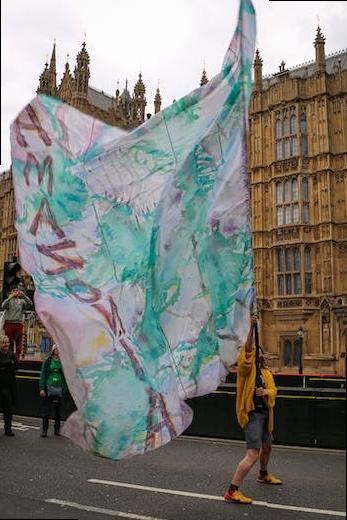The London accent is one of the most distinct and widely recognized accents in the world, with its rich history and unique nuances. One of the most striking features of this accent is the use of slang words, which are often used by native Londoners to add an extra layer of character and flavor to their speech.
Slang words in the London accent have evolved over time and are heavily influenced by the multicultural and diverse population of the city. These words are often used in informal settings, and their understanding can give you an edge in understanding the culture and people of London.
In this article, we will explore the most common slang words used in the London accent, providing a detailed guide on how to understand and use them. We will delve into the meaning and pronunciation of popular slang words like “blimey,” “chuffed,” and “gutted” and provide useful tips for incorporating them into your vocabulary.
Whether you are traveling to London, studying the London accent, or simply curious about the language and culture of this vibrant city, this guide will provide you with a comprehensive understanding of the slang words used in the London accent. By the end of this article, you’ll be able to speak like a true Londoner and impress your friends with your newfound linguistic prowess.
History Of London Slang
London slang has a long and rich history. Its origins date back to the 16th century when cockney rhyming slang emerged among the working-class people in East London. This slang was a way for people to communicate with each other without being understood by outsiders. By the 19th century, the use of slang had spread throughout all of London and became an important part of the city’s identity.
The London accent is also closely associated with slang. It is a distinctive accent that is instantly recognizable. It is characterized by a dropping of the ‘h’ sound in words such as ‘house’ and the substitution of ‘th’ for ‘f,’ as in ‘freef’ instead of ‘three’. The accent has changed over time, with new slang words and phrases being introduced all the time.
Today, London slang is still very much in use, especially among young people. Words like ‘peng’ (meaning something is attractive), ‘bare’ (meaning a lot of something) and ‘peak’ (meaning disappointing) are just a few examples of the current slang. While the use of slang has changed over time, it remains an important part of the city’s identity.
Check out the top trending tourist attractions if you’re wondering what to do in London this weekend.
Key Features Of London Slang
The key features of London slang are a unique aspect of the city’s culture. London slang is generally characterized by the use of rhyming slang, where a phrase is replaced with a two-word phrase that rhymes with the original. Another important feature is the use of Cockney accent, which is a working-class accent often heard in the East End of London. The Cockney accent is known for its dropping of the letter “h” in some words and its use of glottal stops.
London slang also incorporates words and phrases from different cultures and ethnic groups, reflecting the city’s multicultural nature. For example, Jamaican patois has influenced London slang, leading to the use of words such as “man” and “ting.”
If you’re planning on international travel, make sure to check the entry requirements for your destination, including questions like do you need a passport to fly from Glasgow to London?. Understanding the key features of London slang can help visitors navigate the city’s unique dialect and communicate more effectively with locals.
Commonly Used Slang Words
The London accent is packed with a colorful vocabulary that includes slang words commonly used in everyday conversation. Some of the most popular slang words used in London include “innit,” which means “isn’t it?” or “agreed.” “Blimey” is another term used to show surprise or shock. “Butchers,” meaning “look” and “cheers,” meaning “thanks,” are also part of the London slang vocabulary. “Gutted” is a term used to indicate disappointment or sadness, and “bloke” refers to a man.
Another popular London slang word is “mate,” which is used to describe a friend or acquaintance. “Chuffed” means to be pleased, and “lush” is used to describe something that is amazing or really great. In London, “gaff” is slang for a house or living space, while “dosh” refers to money.
To get a better understanding of the London accent, it is important to pay attention to the slang words used in conversation. These words add an extra layer of culture and personality to the language, and can make you feel more immersed in the culture.
If you want to experience the best live music venues for indie bands, check out our guide to things to do in London like a local.
Understanding Slang In Context
Understanding slang in context is key to deciphering the London accent. Slang is an informal language that is widely used in London, and it often varies depending on the social group or location. To make sense of the London accent, it’s important to consider the context in which the slang is used.
For example, the slang term “mate” is commonly used in London, but its meaning can vary depending on the situation. It can be a term of endearment between friends, a way to start a conversation with a stranger, or even a sarcastic insult in certain contexts. Similarly, the word “gutted” is used to describe disappointment, but the intensity of the emotion can vary based on the context.
To fully comprehend the London accent, it’s important to pay attention to the tone of the speaker, their body language, and the situation at hand. The same slang term can have a different meaning depending on the context. For instance, the phrase “having a laugh” can mean someone is joking or that something is absurd, depending on the tone of voice and the context.

In conclusion, understanding slang in context is crucial for comprehending the London accent. To fully understand the meaning behind slang words and phrases, one needs to consider the tone of voice, body language, and situation at hand.
Etiquette Around Using Slang
When using slang and colloquial language, it is important to consider the context and the audience. In a casual setting with friends, using slang can be perfectly acceptable and even encouraged. However, when communicating with strangers or in more formal situations, it is important to use standard English and avoid excessive slang.
When it comes to using a London accent, it is important to remember that accents are part of one’s identity and should be respected. However, it is also important to be mindful of how one’s accent may be perceived by others. Using slang or colloquial language excessively can make it difficult for others to understand, and may come across as unprofessional or disrespectful.

To ensure effective communication, it is recommended to use standard English with proper grammar and minimal use of slang. However, it is also acceptable to incorporate some elements of a London accent into your speech, as long as it does not interfere with clear communication. Ultimately, the key to using slang in a London accent is to strike a balance between authenticity and professionalism.
Regional Variations Of London Slang
London slang is not uniform and varies significantly between regions. The accent in London differs from one region to another. Cockney, for example, is a well-known regional variation, having originated in the East End of London. The Cockney accent is characterized by its distinctive pronunciation, particularly of the letter ‘h’ and the glottal stop.
In North London, features of the accent include the pronunciation of the letter ‘a’ as ‘ah’ and the letter ‘t’ as ‘ch’. South London, on the other hand, has a distinct accent that is similar to the Cockney accent, but with some noticeable differences. West London also has its own distinct variation, with a more relaxed and less pronounced accent than other regions.
Slang also varies significantly between London regions. For example, the slang used in the East End is heavily influenced by the Yiddish and Romani languages, while in the West End, slang tends to have a more sophisticated and classy feel.
Overall, London slang is incredibly diverse, with many different regional variations. Understanding the slang used in specific regions can be challenging, but it’s essential to understanding and communicating effectively with locals.
Modern Changes In London Slang
London slang has undergone several modern changes in recent years, particularly within the context of the London accent. In today’s London, the accent is no longer as distinct as it used to be, with the traditional Cockney accent slowly fading away. This is partly due to the influence of other accents and dialects from people who have moved to London from different parts of the country and the world.
Modern London slang is also influenced by the use of technology and social media. Words like “fail” and “epic” are now regularly used in London slang, along with abbreviations like “LOL” and “BRB”. Additionally, the globalization of popular culture has broadened the vocabulary of London slang to include expressions like “chillax”, “bling”, and “crunk”.
Despite the changes in London slang, there are still some classic phrases that are widely used today, such as “mate”, “innit”, and “gutted”. The London accent remains an important aspect of the city’s identity and is still recognizable, even with the changes in modern slang.
Overall, the modern changes in London slang reflect the diversity and global influence of the city, while still retaining some classic expressions that have been a part of London life for decades.

Tips For Mastering London Slang
1. Listen closely to native Londoners speaking.
2. Learn common London slang words and phrases, such as “innit” (isn’t it), “blud” (mate), and “peng” (attractive).
3. Practice using London slang in everyday conversations.
4. Pay attention to the appropriate context in which to use certain slang words.
5. Watch British television shows and movies to familiarize yourself with the accent and slang.
6. Practice speaking slowly and deliberately to master pronunciation.
7. Ask friends and acquaintances who are native Londoners to help you practice and give you feedback.
8. Use slang dictionaries and online resources to further your understanding.
9. Don’t be afraid to ask for clarification if you don’t understand something.
10. Be patient with yourself and remember that mastering slang takes time and practice.
Resources For Learning London Slang.
There are various resources that can help one to learn London slang and accent. The following are some potential resources:
1. Online learning platforms such as Babbel and Duolingo offer introductory courses on London slang.
2. Mobile applications like “London Slang” and “The London Slang Dictionary” provide users with easy-to-use dictionaries and resources for learning common phrases and words.
3. YouTube channels like “The English with Lucy” and “English Like a Native” offer comprehensive tutorials on London pronunciation and vocabulary.
4. Podcasts like “Real Life London” and “City of London School Podcast” provide insight into how the accent varies among different neighborhoods in the city.
5. TV shows and movies set in London, such as “Sherlock” and “Eastenders”, are great tools to help familiarize oneself with the accent and slang words used in the city.
By consistently utilizing these resources and practicing with native speakers, learners can gradually build up their understanding of London slang and accent. While it may take time, mastering the intricacies of this language variety can greatly enhance one’s experience while visiting or living in the city.
Closing chapter
In conclusion, learning the London accent can be a rewarding process for those who are interested in mastering the unique vocal inflections and intonations of this fascinating dialect. By focusing on various elements of the accent such as the use of glottal stops, the elongation of certain vowel sounds, and the use of colloquialisms and slang terms, individuals can gain a deeper understanding and appreciation of the nuances of the London accent.

To begin this journey, there are several steps that learners can take to develop their skills in this area. Firstly, immersing oneself in the local culture and listening to native speakers can be a great starting point. This can be done by watching movies or TV shows set in London, or by listening to podcasts or radio shows featuring local hosts and guests. Additionally, practicing individual sounds and intonations in isolation can help learners to hone their skills and increase their confidence when speaking.

Another important aspect of learning the London accent is developing an understanding of the specific slang and colloquial terms that are commonly used in the region. By familiarizing themselves with these phrases and using them in context, learners can begin to develop a more natural and authentic-sounding accent.
Ultimately, the key to mastering the London accent is to remain patient, committed, and open to learning new techniques and approaches. With consistent practice and dedication, anyone can develop a strong and confident London accent that will impress friends, colleagues, and fellow Londoners alike.
